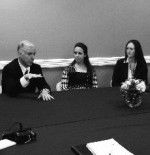What ‘the Dean’ has to offer to raise awareness

November 7, 2007
Let’s be honest. Few of us actually
listened to the Democratic debates
at Drexel on Oct. 30. They were too
long and drawn out for our puny
attention spans, the candidates all
say the same things, and five more of
them will happen between now and
January. What was more interesting
was what was happening before the
debates on Drexel’s campus.
Pennsylvania Governor and
Villanova School of Law graduate
Ed Rendell and Chris Matthews
were chatting on “Hardball” in the
Drexel quad over screaming Ron
Paul supporters.
Paul constituents are extremely
loyal and sometimes loony, as we at
Villanova have witnessed recently
with the anonymous chalk propaganda
all over campus.
Former Alaska Sen. Mike Gravel
was stewing across the street at the
World Live Café, broadcasting his
own debate since “corporate censorship”
at NBC would not allow him
to share the stage with Barack and
Hillary.
ACT UP, the Aids Coalition to
Unleash Power, was brewing at the
corner of 34th and Chestnut, chanting
and jeering in skeleton masks
while they pushed wheelbarrows full
of limp, white mannequins representing
AIDS victims and demanded
more of Hillary’s health-care plan.
And I was at a roundtable with
DNC Chairman Howard Dean along
with 10 other area college journalists
in the Main Building before the
debates began. At this unique event,
the governor of Vermont answered
our questions for over an hour about
the issues most pertinent to college
students and explained how the
Democratic Party plans to appeal
to the most powerful group of voters
this time next November.
First, Dean introduced the
“Neighbor to Neighbor” plan, a
grassroots effort to communicate
the ideals of the Democratic Party
literally door-to-door. At the end of
this week, thousands of volunteers
will knock on doors, 25 houses at a
time. They will do so three separate
times throughout the year in order to
develop a relationship with voters.
Dean claimed that this kind of
personal communication is more effective
than the “hate radio” of Rush
Limbaugh and Bill O’Reilly.
“The idea is to show up, let them
know that we’re not anything like
what those guys say,” Dean said.
When I asked Dean about the issues that are most important to
young adults this election, Dean
cited the cost of college, the environment
and a balanced budget.
“The Republicans cut Pell Grants
so that they could finance the war,”
he said. “They’re going to turn us
into a banana republic if they keep
it up. We need to put back the Pell
Grants, cut the interest rate in half,
expand the numbers of Pell grants,
and increase them by a good percentage.”
About the environment, Dean
was not particularly illustrative.
“The environment is an important
issue for young people because 65 is
a lot closer to me than it is to you.”
And regarding the budget, an
issue he believed to be surprisingly
important to young people he said,
“You all are the ones that are going
to be stuck with the Bush deficits.
That’s going on your credit card.”
One issue he did not explicitly
mention until the roundtable asked
was the war. The Democrats’ idea
for Iraq? A complete pullout, first
removing the National Guard while
training the Iraqi Police force and
Iraqi army and finally removing
the remainder of the troops over 18
months.
“I have no illusions that Iraq is
going to be terrible when we leave,
but it’s going to be terrible if we leave
in one year, two years or 20 years,”
Dean said. “We can’t pull out our
troops tomorrow. It’s not physically
possible, but reasonably it would
take us about a year and a half.”
Dean was adamant about giving
our generation an A on the level of
political participation and involvement.
“I think your generation is grossly
underestimated,” he said. “My generation
got a million people on the
White House lawn during Vietnam,
but you guys write a few million
e-mails to Congress and shut down
their email system.”
According to Dean, voting participation
was up 24 percent between
2002 and 2006 within the block of
voters aged 18-29, but he mentioned
an unusual voting pattern that this
age group seems to follow.
“Most people your age are registering
non partisan and voting
Democrat, which means that we
have to earn that vote every time,”
he said.
When asked why the Democrats
deserve to represent the younger
generation, Dean replied, “Your age
group has built a much more multicultural
generation. The reason
that is important is when you look
at the Democratic Party, your age
group looks at us, and we look like
you. And you are the future of this
country.”
Ending appropriately, Dean had
Villanovan
The Election ’08 Coverage
this to say: “Every one of our campaigns
has to be about people your
age, because if it isn’t, we will pay for
that for the next 60 years.”





